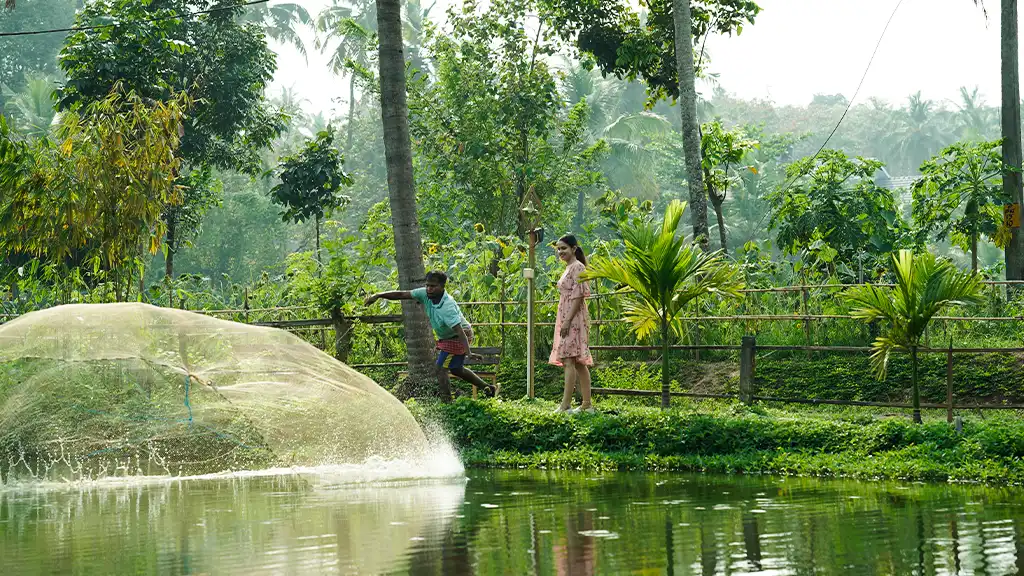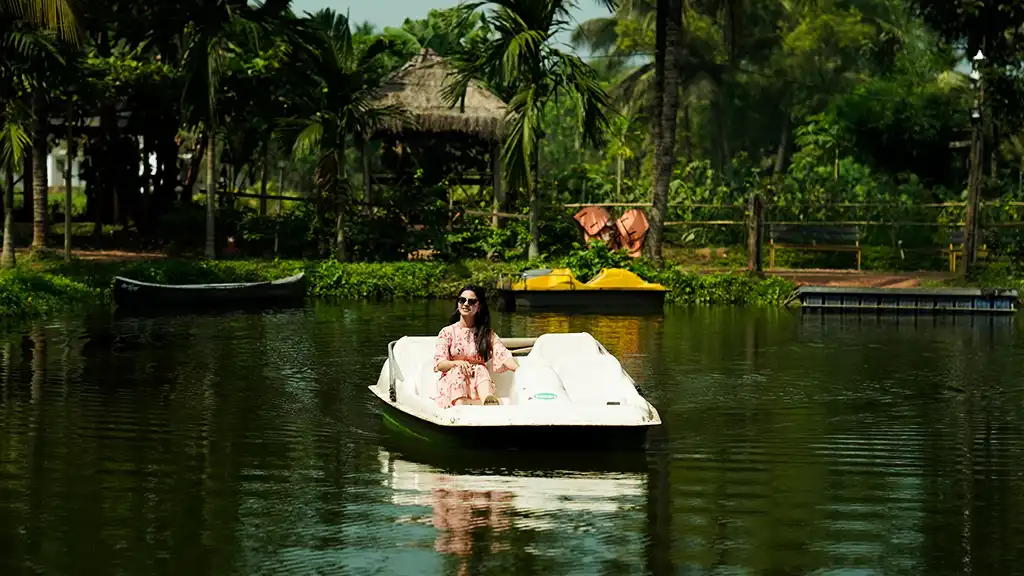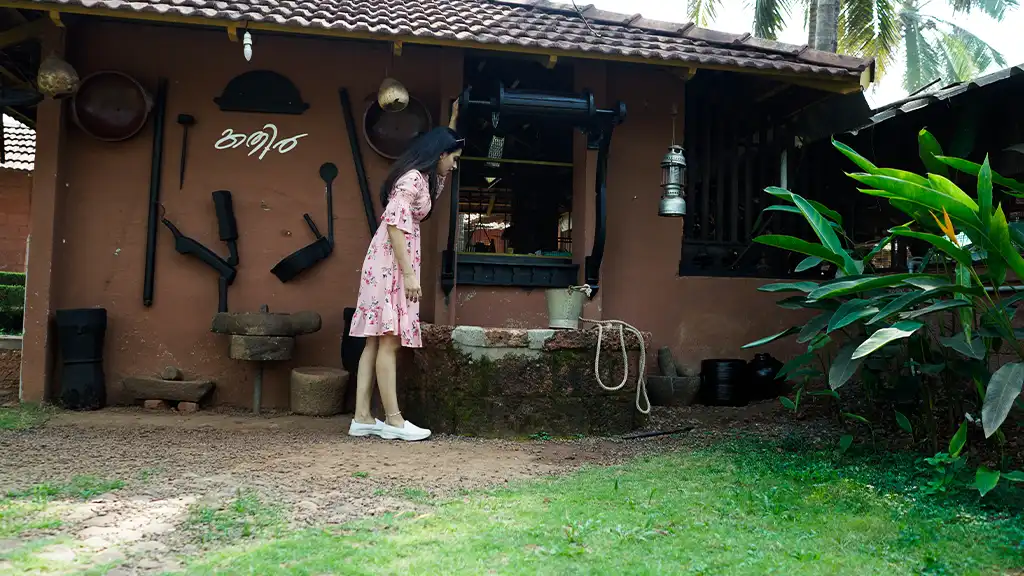
Kerala's organic revolution is a response to the widespread use of fertilizers and pesticides in vegetable farming. Across the state, people can find an array of organic farms, where they can experience firsthand the commitment to sustainable agriculture, and savour the pure, untainted flavours of Kerala’s produce. However, there's one farm that goes beyond mere organic practices - the Kathir Biodiversity Park in Pookkottumpadam, Nilambur in the northern district of Malappuram.
Spearheaded by Kabeer T., this visionary project not only promotes organic farming but also immerses visitors in Kerala's rich culture and traditions. It serves as a beacon of sustainable tourism and prime example of how Responsible Tourism can flourish, inspiring the youth to embrace agriculture and foster regional development.
In 2017, Kabeer T., a mechanical engineer-turned-farmer, embarked on a transformative journey in his native Malappuram. Disheartened by the rampant use of harmful fertilizers in vegetable farming that he saw in Maharashtra and Karnataka, Kabeer decided to reclaim his family's land for a higher purpose. Transforming five barren acres into a thriving farming oasis, Kabeer's vision extends beyond mere agriculture. His farm harmoniously blends flora and fauna, with domesticated ducks, hens and rabbits adding to the picturesque landscape. The raft of ducks in the adjacent artificial pond is a sight for sore eyes.

"I initially intended this space for fish farming or pisciculture. By Onam in 2017, the fry had grown significantly. However, selling them in the market would have resulted in a loss, as the proceeds wouldn't even cover the initial investment. That's when I turned to cooking the fish and selling it directly to customers. I opened a small restaurant on my farm, and people began to appreciate the culinary offerings," says Kabeer.
The same situation applied to vegetables as well. Initially, he sold organic produce at prices higher than the market rate, and customers had no objections due to its exceptional quality. "Currently, we offer cooked meals without any artificial additives," he explains. "Given that this area is a wetland, only seasonal fruits such as watermelon, passion fruit and papaya thrive here. We also prepare and sell juices using these fruits to our customers."
Kabeer himself takes the lead in cooking and serving each guest in the restaurant which is constructed in the shape of a snake boat (chundan vellam), adding to the farm's unique appeal.
The distinctive charm of Kathir Farm sets it apart from other agricultural establishments. Its architecture resembles Kerala's traditional homes, with a thatched palm leaf entrance (padippura), welcoming visitors. A scenic pathway flanked by arecanut trees leads through the farm, alongside a paddy field with a traditional water wheel. Visitors can enjoy horseback riding and gather in a beautifully thatched hall, a popular venue for gatherings and artistic events. A hanging bridge leads to a small island, while pedal boats and coracles offer water-based activities. The farm preserves Kerala's heritage with a traditional well, and showcases models of ancient kitchen utensils like grinding stones, sieves and coconut scrapers.

The farm also boasts of a large pond (3/4 acre) that sets it apart from conventional pisciculture practices. Kabeer's approach to fish farming is distinctive; he maintains deep ponds that promote fish health by ensuring unpolluted water and facilitating daily harvesting. This strategy enables consistent availability throughout the year. In addition to the main pond, the farm features four nursery ponds for fish feeding and two smaller ponds, each measuring 20 cents.
When asked about the farm's popularity with tourists, Kabeer explains, "The success of this place didn't happen overnight. It was a gradual process. I haven't advertised the farm; rather, its reputation has spread through word of mouth. Visitors come not only from Thrissur, Palakkad, and Kozhikode districts of Kerala but also from Tamil Nadu's Nilgiri district."
The entire village of Nilambur is integrated into this initiative. Every household in the vicinity is involved with the 'Kathir' farm project. When guests visit nearby families, they often make a stop at the farm. Additionally, residents from nearby colonies, including those from underprivileged backgrounds, are involved in rearing rabbits, ducks and indigenous chicken breeds. These animals are brought to the farm for sale, where they receive better prices than the market rate. Palm leaf weavers also contribute to the community, with a dedicated team of 20 individuals, most of whom are involved in agricultural activities. Skilled workers handle specific tasks, while others assist with cooking and hospitality.

The farm has emerged as a cultural hub, hosting numerous art, literature and cultural festivals that enhance the area's cultural vibrancy. Within the farm's premises stands a thatched-roof hall resembling an auditorium, which has been the venue for prestigious events like the Kerala Literature Fest.
Renowned literary figures, including T. D. Ramakrishnan, have been honoured at these events. The farm has also welcomed various poetry gatherings (Kavi arang), featuring distinguished personalities such as Kerala Sahitya Academy Winner O. T. Suresh, novelists Subhash Chandran and Kalpatta Narayanan, as well as poet and lyricist Rafeeq Ahammed.
The Kathir Farm has received support from government entities such as the Krishi Bhavan and Fisheries Department. Kabeer has also been honoured with the 'Best Fish Farmer' award by the Fisheries Department for pioneering innovative fish farming techniques at the district level. He was also one of the speakers of the RT Mission’s Global Summit. This has helped him interact with a wider audience and provided a wider reach for his initiative.
“I am happy that Responsible Tourism Mission is giving support to a small project like this. This has further increased the credibility of our products,” adds Kabeer.
"I aspire to transform this space into a sanctuary of biodiversity, where all creatures harmoniously coexist. My goal is to ignite the interest of more young individuals in agriculture," says Kabeer.
Despite encountering numerous challenges since its inception, including the devastating floods of 2018 and 2019, followed by the impact of the COVID-19 pandemic, the farm is now in the process of rejuvenation.
"It brings me joy to see educators choosing this location for educational endeavours. Students from nursery to upper primary levels visit us regularly for educational purposes, and we are able to provide them with an opportunity to forge a deep connection with Nature. This aligns perfectly with my vision of fostering an understanding of our agricultural heritage and roots," concludes Kabeer.